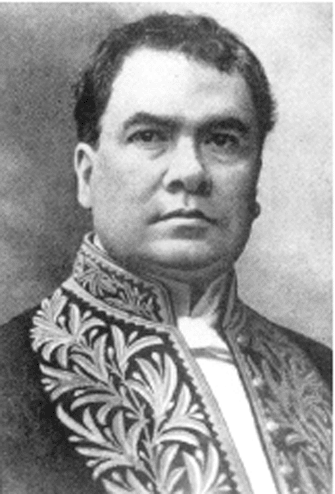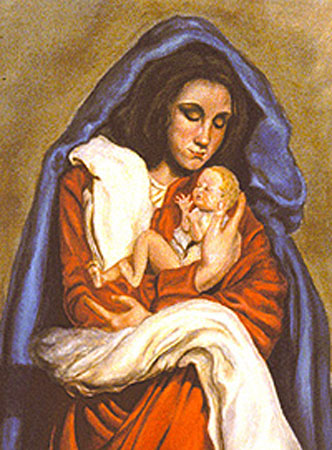|
Ruben Dario was born
on January 18, 1867 in Metapa, Nicaragua (later renamed Ciudad Dario).
At birth, he was named Felix Ruben Garcia Sarmiento and later took the
old family name, Dario. His parents divorced and he was adopted and
raised by his godfather Colonel Felix Ramirez. Dubbed El Nino Poeta (the
poet child), Dario began reading at the age of 3 and at 12 he was
already publishing poems. He called his first three poems "La Fe", "Una
Lagrima" and "El Desengano". In 1882 in an attempt to secure a
scholarship to study in Europe, Dario read his poem, "El Libro" to
conservative Nicaraguan authorities including President Joaquin Zavala.
He was denied the scholarship because his poems were considered too
liberal and officials feared a European education would further
encourage his anti-religious sentiments. Instead, Dario traveled to El
Salvador where he met the well-respected poet, Francisco Gavidia.
Gavidia introduced Dario to the rhythmic structure of French poetry,
which later became the cornerstone of Dario's revolutionary verses.
At the age of 19, Dario moved to Chile and dabbled in journalism. That
year he also wrote his first novel, Emelina, which was unsuccessful.
Nevertheless, his poetry received praise in competitions. In Chile,
Dario was confronted with prejudice and racism due to the dark
complexion of his skin, compared to that of the European influenced
Chileans. Despite his disillusionment and despondency, Dario continued
to be prolific in his writing and published some of his more popular
works such as Azul, "Otonales", and "Primeras Notas".
In 1890 at the age of 24, Dario married Rafaela Contreras and a year
later while living in Costa Rica his son, Ruben Dario Contreras was
born. After fleeing from a military coup, the couple moved to Guatemala
where he was recruited in 1892 to represent Nicaragua in festivity
celebrating the four-century discovery of the New World. The following
year his wife died and he drowned his sorrows in alcohol. Soon after,
Dario involuntarily remarried his ex-girlfriend, Rosario Murillo.
Rosario's brother lured Dario with sex and alcohol, and at gunpoint
forced him to marry Rosario. Her brother found the two lovers in bed and
arranged a marriage in order to restore his sister's honor and
reputation. Dario, who had no recollection of the previous night, awoke
the next morning with a hangover and a new wife. Although never divorced
from Rosario, Dario fell in love with and lived with his mistress,
Francisca Sanchez. In addition, Dario did not limit his sexual
relationships to his wife and mistress and fathered several children,
some whom died and others he never met. Throughout his life, Dario
indulged in alcohol and women and was notorious for his immoderate
lifestyle.
In 1893, Dario was appointed consulate in Columbia by President Miguel
Antonio Caro and traveled to Panama and Argentina. In 1896 Dario
published "Los Raros" poems about other writers such as Poe, Lautreamont,
and Ibse who he likened himself to and who he considered his "twin
souls". Later that same year he published "Prosas Profanas", a book of
poems, which documented his trademark rhythmic style and modernist
approach. At 31, Dario worked for La Nacion, an Argentinean newspaper
and reported his impression about the Spanish during its war with the
United States. While still working as a poet and journalist, he was
named Ambassador of Nicaragua in Paris in 1903. Dario wrote several
poems that exalted his Latino origins and culture such as "Cantos de
Vida y Esperanza" and "Viaje a Nicaragua e Intermezzo Tropical". He
published his autobiography in 1912.
In 1914 Dario was honored in New York with a silver medal from the
Hispanic Society of America. Later that year, he fell ill to pneumonia
and recovered only to find himself financially bankrupt. Colombian poet
and friend, Juan Arana had to beg in the streets of New York to support
Dario. He also managed to collect money from friends in Buenos Aries and
from the Nicaraguan government. The following year Dario returned to
Nicaragua and died there in 1916 at the age of 49 ("Cronologia").
As a poet, journalist, and novelist, Dario remained a prolific writer through
his life. He published his works between the years of 1879 and 1914.
Dario gained recognition throughout Latin American and Spain with the
1905 publication of Azul, a full-length collection of his work. Azul
introduced Dario as the spokesman of a new Latin American modernism.
The collection incited a literary revolution because Dario replaced the
complex Spanish verse with a simple, direct structure ("Ruben Dario
1867-1916"). His most celebrated book, "Cantos de Vida y Esperanza"
was published in Spain in 1905. Although the book touches upon modern
themes such as exoticism, it focuses primarily on Dario himself and his
search for higher conscienceness. It serves as a retrospective account
of the author and his Hispanic roots ("Ruben Dario"). Dario is also
well recognized for his collection of poems, "Prosas Profanas", which
cemented his talent as an engineer of words and language. Dario's work
had a varied in inspiration and form. However, he always linked his
work to a deep seeded pride in his Hispanic origins. In addition,
Dario often wrote about his various travels and experiences. Dario was
primarily influenced by other poets such as Diaz Miron and Julian de
Casal ("Ruben Dario").
The social condition throughout the 19th century gave rise to an intellectual vacuum that sought realization through art, science, politics, and other life arenas. As a result, the modernist movement between 1880 and 1910 developed in an effort to quench the thirst for understanding and enlightenment. Modernism is a combination of romanticism, parnassicism, and symbolism ("Modernism in Poetry"). Dario is a modernist artist who describes his poetry as "the Hispanic form of the universal crisis in literature and spirit that began around 1885" ("Ruben Dario y el Modernismo").
Most countries in Latin America obtained political independence from Spain before 1825. However, independence brought political corruption and violence, which furthered a social eagerness for freedom. During the mid-19th century, Latin American writers modeled free thinking French and Spanish romantics to express the disillusioned Hispano condition. Dario became the voice for his people by using free verse to express values such as individualism and freedom ("Modernism in Poetry").
Dario's poetry, unlike his predecessors', was able to fuse traditional poetic style with new innovations to create a uniquely Dariano verse (Pena, "Dario y Whitman"). Dario is considered the father of the Latin American modernist movement because of his innovative rhythmic and metric structure and his sensual imagery and symbolism ("Ruben Dario 1867-1916"). He is attributed with adding a musical, rhythmic quality and an unparalleled sensitivity and cognizance to his verse. Poet Jorge Luis Borges said, "Dario's place is central. It is not a live influence but a reference point: a point of arrival and a point of departure, a limit that has to be reached or surpassed" ("Ruben Dario y la Critica").
Fellow poet, Enrique Anderson Imbert said, "With incomparable elegance, he brought to poetry a joy of living and a fear of dying." ("Ruben Dario y la Critica"). His poetry and prose left an indelible dent in Hispano literature. Dario created a new poetic world and revolutionized traditional patterns and rhythms. In his poem "El Canto Errante", Dario summarizes his poetic ideals and philosophy, "Poetry will exist as long as there is a problem of life and death. The gift of art is a superior gift that allows you to enter into the unknown of the before and into the ignored of the after, in the world of dreams and meditation. There are no schools; there are poets. The true artist understands all the ways and finds beauty in all forms. All the glory and eternity are in our conscience"
|


